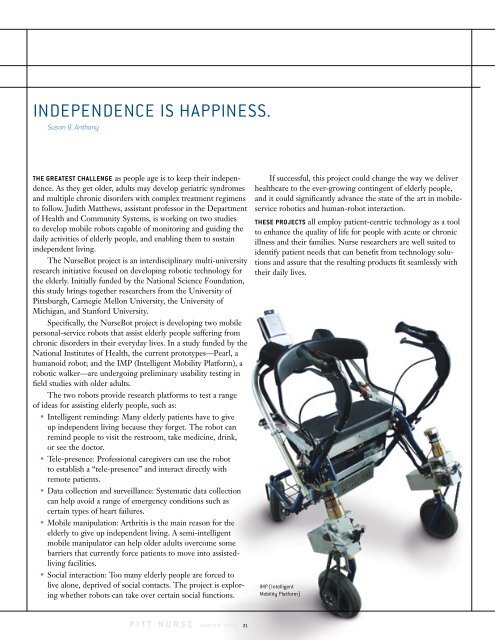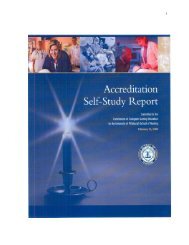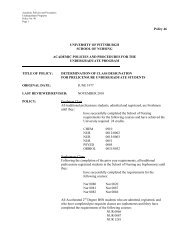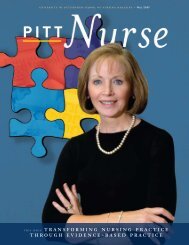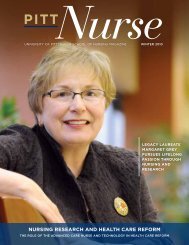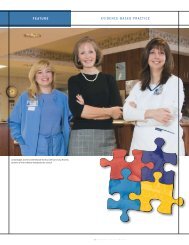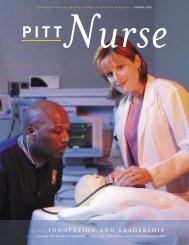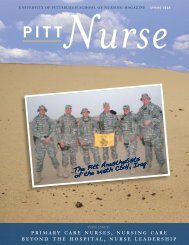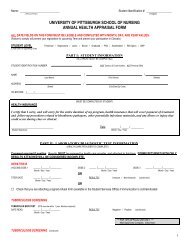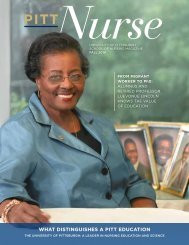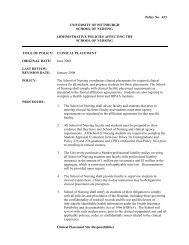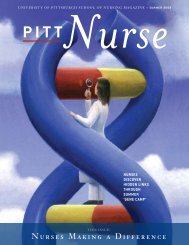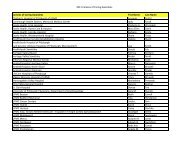“I love you” was the mostfrequent communicationintubated patients usedto express their feelingsto others around them—particularly family.Institute <strong>of</strong> Child Health and HumanDevelopment—looks at communicationsbetween nurses and nonspeakingintensive care unit (ICU) patients. Thisstudy is testing the impact <strong>of</strong> providingnurses with (1) basic communicationskills training and (2) consultation bya language pathologist on the use <strong>of</strong>augmentative and alternative communicationtechniques.In a series <strong>of</strong> observations videotapedover several years, Happ is looking atthe communication between 30 nursesand three nonspeaking ICU patientseach, for a total <strong>of</strong> 90 patients. The communicationinteractions on these tapesare coded and analyzed. To establish abenchmark, Happ first looks at tapes <strong>of</strong>the nurse-patient interactions duringusual care before the intervention. Afternurses receive communications skillstraining developed by the research team,the patient-nurse communication willbe taped again. In the third step, nurseswill receive individual counseling from alanguage pathologist and training in theuse <strong>of</strong> an AACD.Happ’s study provides an objectivemeasurement <strong>of</strong> how the quality andnature <strong>of</strong> communication betweennurses and nonspeaking patients in theICU changes with increased levels <strong>of</strong>information, skill sets, and the addition<strong>of</strong> AACDs.Obesit y is a chronic disorder with ahigh rate <strong>of</strong> recidivism. Lora E. Burke,PhD, MPH, RN, associate pr<strong>of</strong>essorin the Departments <strong>of</strong> Epidemiologyand Health and Community Systems,is developing tools to help patients loseweight—and keep it <strong>of</strong>f.Self-monitoring is the cornerstone<strong>of</strong> behavioral treatment. Documentingand following their behavior andresponses is important for patients whoare trying to lose weight, and is a strongpredictor <strong>of</strong> their long-term weight-losssuccess. But studies show that adherenceto those positive health behaviors maywane over time.Burke’s studies on obesity and weightloss look at self-monitoring, and waysto improve self-monitoring by makingit more timely and less time-consumingas patients go through the many-timesdailyhabit <strong>of</strong> eating. In two studieswith investigators at the <strong>University</strong> <strong>of</strong><strong>Pittsburgh</strong>, Stonybrook <strong>University</strong> inNew York, and Emory <strong>University</strong>, fundedby the National Institute <strong>of</strong> Diabetes andDigestive and Kidney Diseases, Burkeis examining a variety <strong>of</strong> approaches todetermine which ones are most effectivefor individuals tracking their own foodconsumption and physical activity.In an earlier study that looked atpatterns <strong>of</strong> self-monitoring, Burke foundthat weight loss is significantly relatedto frequency <strong>of</strong> self-monitoring andmarginally related to recording withintwo hours <strong>of</strong> eating. The study concludedthat timeliness is important and relatedto outcome.Burke has been working with acompany to develop s<strong>of</strong>tware for apersonal digital assistant (PDA) that willtrack when recording occurs and also willmake self-monitoring easier. The PDAbeing used to track self-monitoring doesmore than keep track <strong>of</strong> when the patientrecords. The recently developed dietarys<strong>of</strong>tware program provides a database<strong>of</strong> more than 6,000 foods and calculatesthe calorie and fat content <strong>of</strong> foodsconsumed, and displays these values.Meanwhile, the physical activity programtracks the patient’s daily physical activityand exercise. This information makes iteasier and more convenient for people toself-monitor how they are doing in relationto their daily goals for calories andfat grams as well as their weekly goals forphysical activity.In a further refinement <strong>of</strong> herintervention study, Burke is measuringthe effect <strong>of</strong> adding messages to the PDAthat provide individuals with feedbackon how they are doing. Burke’s studieshave expanded quite a bit from thesimple paper diary enabling people to seewhat they have actually done as opposedto what they have set for target goals.Burke will be presenting a paper at theSociety <strong>of</strong> Behavioral Medicine’s annualconference in 2006 on her latest findingspertaining to self-monitoring and successin weight loss.Losing weight and keeping it <strong>of</strong>f isdifficult, but Burke is finding ways tohelp individuals succeed.20 u n i v e r s i t y o f p i t t s b u r g h
Independence is happiness.Susan B. AnthonyThe greatest challenge as people age is to keep their independence.As they get older, adults may develop geriatric syndromesand multiple chronic disorders with complex treatment regimensto follow. Judith Matthews, assistant pr<strong>of</strong>essor in the Department<strong>of</strong> Health and Community Systems, is working on two studiesto develop mobile robots capable <strong>of</strong> monitoring and guiding thedaily activities <strong>of</strong> elderly people, and enabling them to sustainindependent living.The NurseBot project is an interdisciplinary multi-universityresearch initiative focused on developing robotic technology forthe elderly. Initially funded by the National Science Foundation,this study brings together researchers from the <strong>University</strong> <strong>of</strong><strong>Pittsburgh</strong>, Carnegie Mellon <strong>University</strong>, the <strong>University</strong> <strong>of</strong>Michigan, and Stanford <strong>University</strong>.Specifically, the NurseBot project is developing two mobilepersonal-service robots that assist elderly people suffering fromchronic disorders in their everyday lives. In a study funded by theNational Institutes <strong>of</strong> Health, the current prototypes—Pearl, ahumanoid robot; and the IMP (Intelligent Mobility Platform), arobotic walker—are undergoing preliminary usability testing infield studies with older adults.The two robots provide research platforms to test a range<strong>of</strong> ideas for assisting elderly people, such as:• Intelligent reminding: Many elderly patients have to giveup independent living because they forget. The robot canremind people to visit the restroom, take medicine, drink,or see the doctor.• Tele-presence: Pr<strong>of</strong>essional caregivers can use the robotto establish a “tele-presence” and interact directly withremote patients.• Data collection and surveillance: Systematic data collectioncan help avoid a range <strong>of</strong> emergency conditions such ascertain types <strong>of</strong> heart failures.• Mobile manipulation: Arthritis is the main reason for theelderly to give up independent living. A semi-intelligentmobile manipulator can help older adults overcome somebarriers that currently force patients to move into assistedlivingfacilities.• Social interaction: Too many elderly people are forced tolive alone, deprived <strong>of</strong> social contacts. The project is exploringwhether robots can take over certain social functions.If successful, this project could change the way we deliverhealthcare to the ever-growing contingent <strong>of</strong> elderly people,and it could significantly advance the state <strong>of</strong> the art in mobileservicerobotics and human-robot interaction.These projects all employ patient-centric technology as a toolto enhance the quality <strong>of</strong> life for people with acute or chronicillness and their families. Nurse researchers are well suited toidentify patient needs that can benefit from technology solutionsand assure that the resulting products fit seamlessly withtheir daily lives.IMP (IntelligentMobility Platform)p i t t N u r s e W i n t e r 2 0 0 6 21


